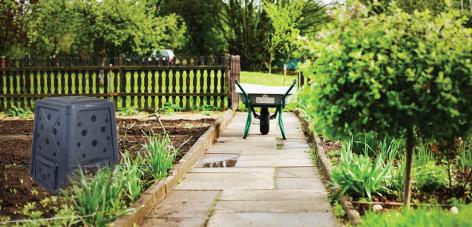
2 minute read
Demystifying Compost
You might wonder, “What is compost?” or ask, “Why should I consider composting?” Let us help explain what it is and the benefits of composting.
Composting is a process that converts organic materials (i.e., wasted food scraps and yard debris) into a nutrient-rich soil amendment or mulch through natural decomposition. Macro organisms like worms and insects and microorganisms like bacteria and fungi feed on our waste materials and do all the hard work to create a dark, crumbly, earthy-smelling material known as compost.
Composting is nature’s way of recycling. By composting, you sustainably reduce the amount of trash you send to the landfill or incinerators. In turn, you prevent additional greenhouse gases being sent into the atmosphere. Not only does it build healthier soil, prevent erosion, and help you conserve water, but it also improves plant growth in your garden and yard. And the big bonus you don’t want to miss is it can save you money by reducing your use of fertilizer and pesticides and decreases the chance of excess chemicals getting into our water.
In a few easy steps you can use a bin, bucket, or even a pile to start. Combine two parts browns to every one part green, keep things moist, and occasionally turn the materials to add air. Browns and greens are easily identified by their name. Browns include things like dry leaves and yard trimmings (brown in color) and greens are things like food scraps and grass clippings (greener in color). Something to always remember is to never add meat, dairy, or greasy foods to your pile. These will attract unwanted pests. As waste decomposes, you reap the benefits. Add finished compost to your soil to improve the health of your soil, help the soil retain moisture and nutrients, attract beneficial organisms to the soil, and reduce the need for pesticides and fertilizers.
Now don’t you want to get out there and compost?





